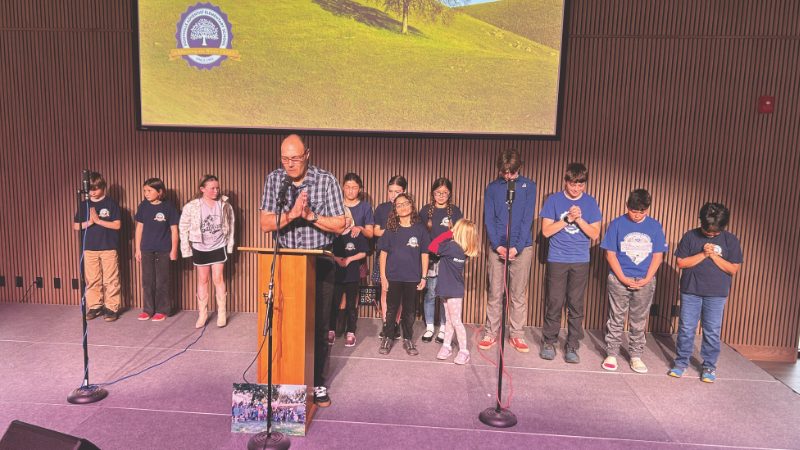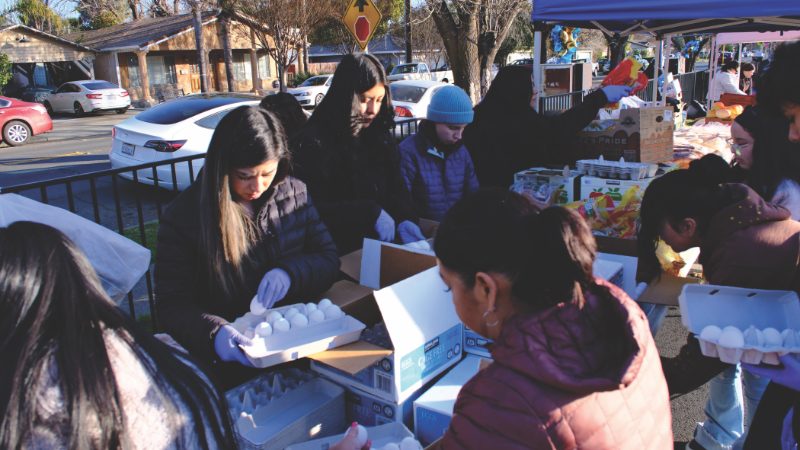The first thanksgiving feast was not the one to which the Pilgrims and the Native Americans sat down more than 300 years ago. The Scriptures tell of countless others that occurred long before.
The people of Israel celebrated an annual thanksgiving, the Feast of Tabernacles, which was the crowning festival of the year. The year had ended; the people were free from labor; all their sins had been removed, as typified in the Day of Atonement services held a few days before. The Feast of Tabernacles was a time for remembering the good things the Lord had given. It was a real time for thanksgiving—a giving of thanks for the bounties of the harvest, for the plan of salvation, for surcease from toil, for sins forgiven. It would be well for God's people today to celebrate a Feast of Tabernacles—a joyous thanksgiving for the blessings of God.
The Levites’ joyful thanksgiving at the dedication of Solomon’s Temple was met with a profound manifestation of God’s glory—so powerful that they were compelled to pause their ministering for a time (2 Chronicles 5:13-14). This dramatic divine indwelling may both stem from and inspire a life of continual thanksgiving in human hearts today.
David’s psalms overflowed with a spirit of thanksgiving, reflecting a life deeply grateful to God. He ordered thanksgiving celebrations when true worship was restored to the Israelites and the ark of God returned to its rightful place (1 Chronicles 16:4). As David wrote, “Enter his gates with thanksgiving, and his courts with praise! Give thanks to him, bless his name!” (Psalm 100:4).1 Likewise, Jonah’s deliverance hinged on his prayer of thanksgiving, which marked a turning point in his experience. “‘But I with the voice of thanksgiving will sacrifice to thee; what I have vowed I will pay. Deliverance belongs to the Lord!’ And the Lord spoke to the fish, and it vomited out Jonah upon the dry land” (Jonah 2:9-10).
With a humble heart, Daniel offered heartfelt gratitude to the all-wise God for the gift of wisdom. “To thee, O God of my fathers, I give thanks and praise, for thou hast given me wisdom and strength” (Daniel 2:23). Thanksgiving was not a mere annual ritual for him; it was a daily practice woven into his regular prayers three times a day.
Nehemiah oversaw the monumental task of restoring Jerusalem’s walls. Upon the project’s completion, priests standing atop the rebuilt fortifications sang one of history’s grandest thanksgiving oratorios. “Then I [Nehemiah] brought up the princes of Judah upon the wall, and appointed two great companies which gave thanks and went in procession” (Nehemiah 12:31).
On the day Jesus was brought to the Temple in Mary’s arms, the aged prophetess Anna experienced a profound moment of thanksgiving for the privilege of seeing the long-awaited Messiah. “And coming up at that very hour she gave thanks to God, and spoke of him to all who were looking for the redemption of Jerusalem” (Luke 2:38). This climactic event in her life pales in comparison, however, to the joyous thanksgiving that will come when those who love Christ witness His glorious second coming in the clouds.
Of the ten lepers miraculously healed by Jesus, only one returned to express gratitude for the blessing he had received. The other nine failed to appreciate the true happiness that comes from giving thanks. “Then one of them, when he saw that he was healed, turned back, praising God with a loud voice; and he fell on his face at Jesus’ feet, giving him thanks” (Luke 17:15-16).
In Jesus' parable, the Pharisee, unlike the repentant publican, merely feigned gratitude, believing he lacked nothing and therefore received nothing. This self-righteous man could only feel thankful that he was “not like other men” (Luke 18:11), a tragic reflection of his spiritual poverty. In contrast, the humble publican returned home overflowing with genuine thanksgiving for the forgiveness of his sins.
In His prayers, Jesus frequently expressed gratitude. For instance, we see Him thanking the Father that the plan of salvation is straightforward and easy to comprehend (Matthew 11:25). Similarly, at the graveside of Lazarus, Jesus offered thanks to the Father for answered prayer, even before Lazarus emerged from the tomb (John 11:41).
Despite the numerous hardships that plagued Paul’s life, more so than the other apostles, his epistles were filled with an abundance of grateful praise to God. This gratitude is exemplified in his words: “O wretched man that I am! who shall deliver me from the body of this death? I thank God through Jesus Christ our Lord” (Romans 7:24-25, KJV). Elsewhere, Paul exclaimed, “But thanks be to God, which giveth us the victory through our Lord Jesus Christ” (1 Corinthians 15:57, KJV). Though he was burdened by life’s difficulties, Paul’s writings consistently expressed deep thankfulness to God.
The Scriptures promise an eternal thanksgiving celebration in the new earth, as the Lord comforts Zion and fills it with joy, gladness, and the sound of melody. “For the Lord will comfort Zion; he will comfort all her waste places, and will make her wilderness like Eden, her desert like the garden of the Lord; joy and gladness will be found in her, thanksgiving and the voice of song” (Isaiah 51:3). This future thanksgiving is something we can praise God for today.
As we gather around the Thanksgiving table, let us remember the heartfelt gratitude the Pilgrims expressed to God. Like the great Bible figures, may we make thanksgiving an integral part of our lives, echoing the words of David: “I will offer to thee the sacrifice of thanksgiving, and call on the name of the Lord” (Psalm 116:17).
_____________________________
Frank Gordon is a freelance writer from Tucson, Arizona.
1 Unless otherwise indicated, all Scripture quotations are from the Revised Standard Version.
Con un corazón agradecido
La primera fiesta de acción de gracias no fue aquella a la que se sentaron los peregrinos y los nativos americanos hace más de 300 años. Las Escrituras hablan de muchas otras que ocurrieron mucho antes.
El pueblo de Israel celebraba una acción de gracias anual, la Fiesta de los Tabernáculos, que era la fiesta suprema del año. El año había terminado; el pueblo estaba libre de trabajo; todos sus pecados habían sido removidos, como se tipificaba en los servicios del Día de la Expiación celebrados unos días antes. La Fiesta de los Tabernáculos era un tiempo para recordar todas las cosas buenas que el Señor les había dado. Era un verdadero tiempo de acción de gracias, de estar agradecidos por las bondades de la cosecha, por el plan de salvación, por el cese del trabajo, por los pecados perdonados. Sería bueno que el pueblo de Dios celebrara hoy una Fiesta de los Tabernáculos, una gozosa acción de gracias por las bendiciones de Dios.
La gozosa acción de gracias de los levitas por la dedicación del Templo de Salomón fue recibida con una profunda manifestación de la gloria de Dios, tan poderosa que se vieron obligados a hacer una pausa en su ministerio por un tiempo (2 Crónicas 5:13-14). Esa dramática morada divina puede surgir e inspirar una vida de continua acción de gracias en los corazones humanos de hoy.
Los salmos de David rebosaban de un espíritu de acción de gracias, reflejando una vida profundamente agradecida a Dios. David ordenó celebraciones de acción de gracias cuando la verdadera adoración fue restaurada a los israelitas y el arca de Dios regresó a su lugar legítimo (1 Crónicas 16:4). Como escribió David: «Entren por sus puertas con acción de gracias, y sus atrios con alabanza. ¡Dénle gracias, bendicgan su nombre!» (Salmo 100:4).1 Del mismo modo, la liberación de Jonás dependió de su oración de acción de gracias, que marcó un punto de inflexión en su experiencia. «“Pero yo con voz de acción de gracias te ofreceré sacrificios; lo que he prometido que pagaré. ¡La liberación pertenece al Señor!” Y Jehová habló al pez, y éste vomitó a Jonás en tierra seca» (Jonás 2:9-10).
Con un corazón humilde, Daniel expresó su sincera gratitud al Dios omnisapiente por el don de la sabiduría. «A ti, oh Dios de mis padres, te doy gracias y alabanza, porque me has dado sabiduría y fuerza» (Daniel 2:23). El día de acción de gracias no era para él un simple ritual anual; era una práctica diaria entretejida en sus oraciones regulares tres veces al día.
Nehemías supervisó la monumental tarea de restaurar las murallas de Jerusalén. Al finalizar el proyecto, los sacerdotes que se encontraban en lo alto de las fortificaciones reconstruidas cantaron uno de los oratorios de acción de gracias más grandiosos de la historia. «Entonces yo [Nehemías] subí a los príncipes de Judá sobre la muralla, y designé dos grandes grupos que daban gracias y salían en procesión» (Nehemías 12:31).
El día en que Jesús fue llevado al templo en los brazos de María, la anciana profetisa Ana experimentó un profundo momento de acción de gracias por el privilegio de ver al Mesías tan esperado. «Y subiendo a aquella misma hora, dio gracias a Dios, y habló de él a todos los que esperaban la redención de Jerusalén» (Lucas 2:38). Sin embargo, ese acontecimiento culminante en su vida palidece en comparación con la gozosa acción de gracias que vendrá cuando los que aman a Cristo sean testigos de su gloriosa segunda venida en las nubes.
De los diez leprosos sanados milagrosamente por Jesús, solo uno regresó para expresar gratitud por la bendición que había recibido. Los otros nueve no apreciaron la verdadera felicidad que proviene de dar gracias. «Entonces uno de ellos, al ver que había sido sanado, se volvió, alabando a Dios a gran voz; y se postró sobre su rostro a los pies de Jesús, dándole gracias» (Lucas 17:15-16).
En la parábola de Jesús, el fariseo, a diferencia del publicano arrepentido, simplemente fingió gratitud, creyendo que no le faltaba nada y, por lo tanto, no recibía nada. Ese santurrón solo podía sentirse agradecido de que «no era como los demás hombres» (Lucas 18:11), un reflejo trágico de su pobreza espiritual. En contraste, el humilde publicano regresó a casa rebosante de genuina gratitud por el perdón de sus pecados.
En sus oraciones, Jesús expresaba gratitud con frecuencia. Por ejemplo, lo vemos agradeciendo al Padre porque el plan de salvación es sencillo y fácil de comprender (Mateo 11:25). De manera similar, junto a la tumba de Lázaro, Jesús dio gracias al Padre por la respuesta a la oración, incluso antes de que Lázaro saliera de la tumba (Juan 11:41).
A pesar de las numerosas dificultades que plagaron la vida de Pablo, más que la de los otros apóstoles, sus epístolas estaban llenas de una gran cantidad de alabanzas agradecidas a Dios. Esa gratitud se ejemplifica en sus palabras: «¡Oh miserable de mí! ¿Quién me librará de los cuerpos de esta muerte? Doy gracias a Dios por medio de Jesucristo Señor nuestro» (Romanos 7:24-25). En otro lugar, Pablo exclamó: «Pero gracias a Dios, que nos da la victoria por medio de nuestro Señor Jesucristo» (1 Corintios 15:57). Aunque estaba agobiado por las dificultades de la vida, los escritos de Pablo expresaban constantemente un profundo agradecimiento a Dios.
Las Escrituras prometen una eterna celebración de acción de gracias en la nueva tierra, cuando el Señor consuele a Sión y la llene de gozo, alegría y el son del canto. «Porque el Señor consolará a Sión; él consolará todos sus desiertos, y hará su desierto como el Edén, y su desierto como el jardín del Señor; en ella se hallará gozo y alegría, acción de gracias y voz de cántico» (Isaías 51:3). Esa futura acción de gracias es algo por lo que podemos alabar a Dios hoy.
Al reunirnos alrededor de la mesa de acción de gracias, recordemos la sincera gratitud que los peregrinos expresaron a Dios. Al igual que las grandes figuras de la Biblia, hagamos de la acción de gracias una parte integral de nuestra vida, haciéndonos eco de las palabras de David: «Te ofreceré sacrificio de acción de gracias e invocaré el nombre del Señor» (Salmo 116:17).
_____________________________
Frank Gordon escribe desde Tucson, Arizona.






